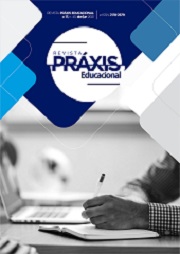Modernization of the institute granting academic titles to scientific and pedagogical staff of the Russian Federation
DOI:
https://doi.org/10.22481/praxisedu.v17i45.7210Keywords:
Docent, Education, ProfessorAbstract
Taking into account, that science and education in Russia are related to certain priority areas designated by the State and the social development policy, this article is focused on the issues related to the modernization of the academic degrees’ system in Russia. This system is characterized by multiple imperfections that particularly influence the motivation of high-education teaching personnel. In this paper, the authors study several recent problems encountered in the current legal regulation governing the attribution of academic degrees in Russia while observing its inconsistencies and legal contradictions. The paper also contains an analysis of suggested proposals that could be added to the current legal texts, regulating the institution responsible for academic degree attribution. In general, the authors suggest a conceptual approach to modernize the mechanisms of normative legal regulation which organizes the attribution of academic ranks. It is suggested to improve the evaluation system of scientific publications used to evaluate applicants for an academic degree, and to establish a transition towards a point-based evaluation system based on the quality of scientific and educational work. The thesis formulated expresses the need to develop a system of social and material guarantees for the benefit of scientific and educational staff and the implementation of effective means to motivate their educational and research activity.
Downloads
References
VASILIEV, S. A. The Development of Legal Regulation of Constitutional Law Relations Between Government and Scientific Community in Questions of the Appointment to Scientific Ranks. Russian Law Online, Moscow, Vol. 2, p. 22-35, 2017.
VESNINA, L. V. Changing Trends in Contemporary Education. The Bulletin of Tomsk State Teachers University, Tomsk, Russia, Vol. 2, p. 17-23, 2010.
VENEDIKTOV, A. A. On the Creating of Verification System for Documents in the Sphere of the Attestation of Scientific Faculty. Armament and Economy, Moscow, Vol. 4, p. 56-62, 2018.
GERMANY. Law on the Payment for Labor dated on 23 May 1975. Available on: https://www.gesetze-im-internet.de/bbesg/BJNR011740975.html. Accessed on: 23 June 2020.
IVANISHEVA, N.A. Historical and Teaching Analysis of the Genesis and Development of the Institution of Scientific Faculty Attestation. The Bulletin of Moscow University. Series 20: Teachers Education, Moscow, Vol. 2, p. 106-117, 2012.
KLEANDROV, M. I. On the Radical Transformation of the Mechanism of the Appointment to Scientific Rank of Professor. State and Law, Moscow, Vol. 3, p. 27-37, 2019.
MOLDOVA. Code № 259 dated on 15 July 2004. Kishinev. 2004. Available on: http://lex.justice.md/ru/286236/. Accessed on: 23 June 2020.
SCIENTIFIC RUSSIA. The Council for Science Has Criticized the Rules of the Appointment to Scientific Ranks and Suggest to Eliminate the List of the Higher Attestation Commission. 2015. Available on: https://scientificrussia.ru/articles/sovet-po-nauke-vystupil-s-kritikoj-pravil-prisuzhdeniya-uchenyh-zvanij-i-predlozheniem-ob-otmene-perechnya-vak. Accessed on: 20 May 2020.
PROHOROVA, M. P., SHKUNOVA, A. A., BULGANINA, A. E., GRIGORYAN, K. M. The Directions of the Transforming of the Higher Education Within the Framework of Digitalization. Azimuth of Research Studies: Teaching and Psychology, Togliatti, Russia, P. 9, Vol. 2, p. 299-302, 2020.
RAS. Regulation of the Presidium of the Russian Academy of Sciences № 204 dated on 29 September 2015. Moscow. 2015. Available on: http://www.ras.ru/presidium/documents/directions.aspx?ID=adf67dc8-84b3-4350-b4be-7e1dce9b71ec. Accessed on: 21 May 2020.
RUSSIA. Order of the Ministry of Science and Higher Education of the Russian Federation № 611 dated on 16 August 2019. Moscow. 2019. Available on: http://pravo.gov.ru/proxy/ips/?docbody=&nd=102664735&intelsearch=%CF%EE%F0%FF%E4%EE%EA+%EE%F4%EE%F0%EC%EB%E5%ED%E8%FF+%E8+%E2%FB%E4%E0%F7%E8+%E0%F2%F2%E5%F1%F2%E0%F2%EE%E2+%EE+%EF%F0%E8%F1%E2%EE%E5%ED%E8%E8+%F3%F7%E5%ED%FB%F5+%E7%E2%E0%ED%E8%E9. Accessed on: 21 June 2020.
RUSSIA. Order of the Ministry of Education and Science of the Russian Federation № 1620 dated from 25 December 2014. Moscow. 2014. Available on: http://docs.cntd.ru/document/420245395. Accessed on: 21 June 2020.
RUSSIA. Resolution of the Government № 1139 dated from 10 December 2013. Available on: http://pravo.gov.ru/proxy/ips/?docbody=&nd=102169683&intelsearch=%CE+%EF%EE%F0%FF%E4%EA%E5+%EF%F0%E8%F1%E2%EE%E5%ED%E8%FF+%F3%F7%E5%ED%FB%F5+%E7%E2%E0%ED%E8%E9. Accessed on: 21 June 2020.
RUSSIA. Federal Law № 273-FL dated on 29 December 2012. Moscow. 2012. Available on: http://pravo.gov.ru/proxy/ips/?docbody=&nd=102162745&intelsearch=%D4%E5%E4%E5%F0%E0%EB%FC%ED%FB%E9+%E7%E0%EA%EE%ED+%EE%F2+29+%E4%E5%EA%E0%E1%F0%FF+2012+%B9+273-%D4%C7+%AB%CE%E1+%EE%E1%F0%E0%E7%EE%E2%E0%ED%E8%E8+%E2+%D0%EE%F1%F1%E8%E9%F1%EA%EE%E9+%D4%E5%E4%E5%F0%E0%F6%E8%E8%BB. Accessed on: 21 July 2020.
RUSSIA. Federal Law № 127-FL dated on 23 August 1996. Moscow. 1996. Available on: http://pravo.gov.ru/proxy/ips/?docbody=&nd=102043112&intelsearch=%E7%E0%EA%EE%ED+%EE+%ED%E0%F3%EA%E5. Accessed on: 20 June 2020.
SENASHENKO, V. S. On the Prestige of the Profession “The Teacher of a Higher School”, Scientific Degrees and Scientific Ranks. Higher Education in Russia, Moscow, Vol. 2, p. 36-44, 2017.
UKRAINE. Law № 1556-VII dated on 1 July 2014. Kiev. 2014. Available on: https://zakon.rada.gov.ua/laws/show/1556-18#Text. Accessed on: 23 June 2020.
Downloads
Published
Issue
Section
License
Copyright (c) 2021 Práxis Educacional

This work is licensed under a Creative Commons Attribution-ShareAlike 4.0 International License.
Você é livre para:
Compartilhar - copia e redistribui o material em qualquer meio ou formato; Adapte - remixe, transforme e construa a partir do material para qualquer propósito, mesmo comercialmente. Esta licença é aceitável para Obras Culturais Livres. O licenciante não pode revogar essas liberdades, desde que você siga os termos da licença.
Sob os seguintes termos:
Atribuição - você deve dar o crédito apropriado, fornecer um link para a licença e indicar se alguma alteração foi feita. Você pode fazer isso de qualquer maneira razoável, mas não de uma forma que sugira que você ou seu uso seja aprovado pelo licenciante.
Não há restrições adicionais - Você não pode aplicar termos legais ou medidas tecnológicas que restrinjam legalmente outros para fazer qualquer uso permitido pela licença.












